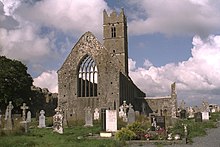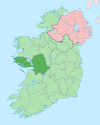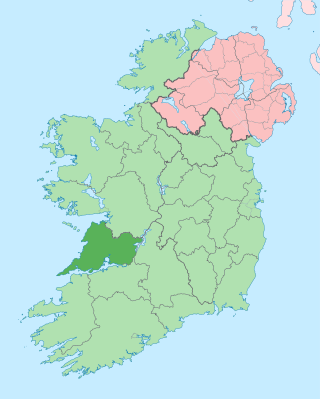
County Clare is a county in the province of Munster in the Southern part of the republic of Ireland, bordered on the west by the Atlantic Ocean. Clare County Council is the local authority. The county had a population of 127,938 at the 2022 census. The county seat and largest settlement is Ennis.
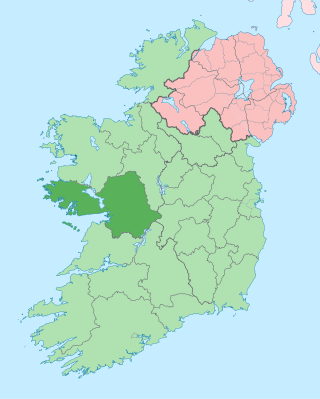
County Galway is a county in Ireland. It is in the Northern and Western Region, taking up the south of the province of Connacht. The county population was 276,451 at the 2022 census.

Galway is a city in County Galway. It lies on the River Corrib between Lough Corrib and Galway Bay. It is the most populous settlement in the province of Connacht, the fifth most populous city on the island of Ireland and the fourth most populous in the Republic of Ireland, with a population at the 2022 census of 85,910.
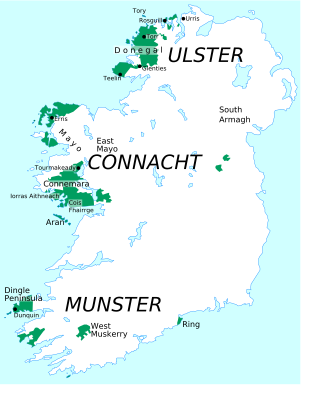
A Gaeltacht is a district of Ireland, either individually or collectively, where the Irish government recognises that the Irish language is the predominant vernacular, or language of the home. The Gaeltacht districts were first officially recognised during the 1920s in the early years of the Irish Free State, following the Gaelic revival, as part of a government policy aimed at restoring the Irish language.

Ballyvaughan or Ballyvaghan is a small harbour village in County Clare, Ireland. It is located on the N67 road on the south shores of Galway Bay, in the northwest corner of The Burren. This position on the coast road and the close proximity to many of the area's sights has turned the village into a local center of tourism activity. At the time of the 2011 census Ballyvaughan had a population of 258. The area was officially classified as part of the West Clare Gaeltacht, an Irish-speaking community, until 1956.

The River Corrib in the west of Ireland flows from Lough Corrib through Galway to Galway Bay. The river is among the shortest in Europe, with only a length of six kilometres from the lough to the Atlantic. It is popular with local whitewater kayakers as well as several rowing clubs and pleasure craft. The depth of this river reaches up to 94 feet.
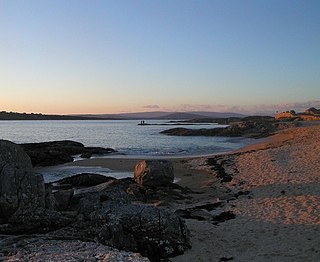
Carraroe is a village in Connemara, the coastal Irish-speaking region (Gaeltacht) of County Galway, Ireland. It is known for its traditional fishing boats, the Galway Hookers. Its population is widely dispersed over the Carraroe peninsula between Cuan an Fhir Mhóir and Cuan Chasla. Carraroe has an unusual beach, Trá an Dóilín, a biogenic gravel beach made of coralline algae known as "maerl".
Galway, a small city in Ireland, situated on the west coast of Ireland, has a complex history going back around 800 years. The city was the only medieval city in the province of Connacht.

Furbo or Furbogh is a settlement in Connemara, County Galway, Ireland. As of the 2022 census, it had a population of 868 people. It lies along the coast, overlooking Galway Bay, in a Gaeltacht area.
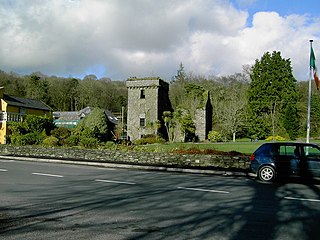
Ballyvourney is a Gaeltacht village in southwest County Cork, Ireland. Ballyvourney is also a civil parish in the barony of Muskerry West, and an ecclesiastical parish in the Roman Catholic Diocese of Cloyne. The village is part of the Cork North-West Dáil Constituency.

Ring or Ringagonagh is a parish within the Irish-speaking Gaeltacht na nDéise area in County Waterford, Ireland. It lies on a peninsula about eleven kilometres (7 mi) south of Dungarvan. The main settlement is the village of Ring or Ringville, which is within the townland of Ballynagaul.

Carnmore is an electoral area located at the southern end of the parish of Claregalway, approximately 8 miles (13 km) east of Galway city in County Galway, Ireland. Carnmore is in a Gaeltacht area, although the majority of residents use English as their first language. Incorporating the townlands of Carnmore, Carnmore West and Carnmore East, the area is represented in hurling competitions by Carnmore GAA. Galway Airport is also nearby.
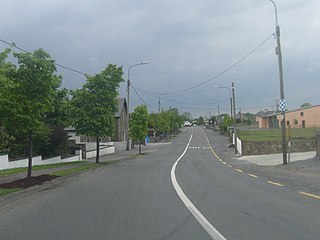
Milltown is a small village in County Galway, Ireland. It is situated on the banks of the River Clare, 47 km from Galway City, 11 km from Tuam on the N17 road to Sligo.

Crookstown is a small village in County Cork in Ireland, about 12 km east of the town of Macroom and about 1 km off the N22 Cork–Killarney road. It had a population of 183 at the 2022 census, down from 203 in the 2016 census.

Boston is a village in north County Clare, Ireland. It is situated near Lough Bunny, off the R460 road from Corofin to Gort, at the northeastern edge of the Burren National Park, and close to the border with County Galway. It is at the intersection of the townlands of Kylecreen, Drumnadeevna, and Rockvale, which are in the civil parish of Kilkeedy.

Joyce Country is a cultural region in counties Galway and Mayo in Ireland. It is sometimes called Partry, after the former tribal territory of the Partraige, which it largely matches. Part of it falls within the Connacht Gaeltacht. Joyce Country lies on the shores of Lough Mask and Lough Corrib, and includes the Partry Mountains. It is a rural area that includes small settlements such as Clonbur, Cong, Cornamona and Toormakeady. It borders Connemara, to its south and west.
Annaghdown is a civil parish in County Galway, Ireland. It lies around Annaghdown Bay, an inlet of Lough Corrib. Villages in the civil parish include Corrandulla and Currandrum. Annaghdown is also an ecclesiastical parish in the Roman Catholic Archdiocese of Tuam and the Church of Ireland Diocese of Tuam, Killala and Achonry.
A Neo-Gaeltacht is an area where Irish has a strong presence as a spoken language but is not part of the officially defined or traditional Gaeltacht areas. It has been argued that non-Gaeltacht activist groups wishing to establish an Irish language community need to show that it is large, permanent and formally organised and that it has a growing number of people using Irish as their first language. Another objective is a situation in which children use Irish among themselves and with other Irish speakers in a natural way while being able to deal with a largely English-speaking world.
The Achréidh na Gaillimhe comprises five electoral divisions: Bearna, Baile an Bhriotaigh, An Caisleán Gearr, Mionlach and Cnoc na Cathrach. Due to its proximity to Ireland's biggest Gaeltacht, Galway city has always been important for the language movement and many Irish speakers settling or moving to Galway. According to the 2016 census, 31,583 people (41%) in Galway City said they could speak Irish, but only 2,344 people (3%) spoke it daily.

